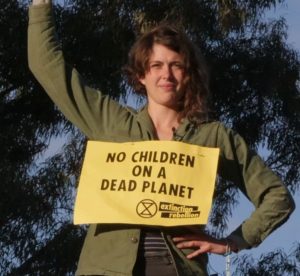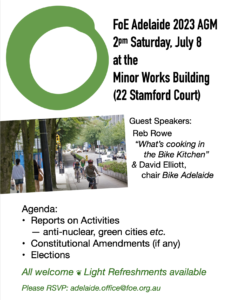These posts are to appear in the fortnightly newsletter
Adelaide FoE Notes
Outrageous anti-protest laws
Clearly the SA government was annoyed by the protests at the APPEA conference: by the Thursday of that week, the lower house had passed legislation dramatically increasing penalties for public protests.
If you are concerned about this threat to democracy, come to the snap protest this Friday, May 26th at 6pm at Parliament House. Event by Adelaide Uni Students for Climate Justice, Adelaide Campaign Against Racism and Fascism and others
Earlier this week, the Human Rights Law Centre released an explainer which revealed many of the problems with the ill-considered legislation
… Read more >>The Bill: Summary Offences (obstruction of Public Places) Amendment 2023 (SA)
On 18 May 2023, the South Australian Legislative Assembly introduced, and passed, the Summary Offences (Obstruction of Public Places) Amendment (The Bill) in response to protest activity in Adelaide which briefly closed traffic. The Bill amends section 58 of the Summary Offences Act 1953 (The Act) to, among other things, dramatically increase the maximum penalty for obstructing a public place. The Bill is currently before the Legislative Council for deliberation.
…Section 2(1)
2(1)
Section 2(1) of the Bill increases the penalty for obstructing a public place from $750 to a maximum of $50,000 or a maximum term of imprisonment of 3 months. This is a 60-fold increase to the maximum financial penalty; the Act does not currently provide imprisonment as a penalty for obstructing a public place. It is intended that these penalties would have a strong deterrent effect to protestors who block public space.
…
Section (3) (1a)
Section (3) (1a) of the Bill makes defendants criminally responsible for their direct obstruction of a public place, but it also intends to capture conduct even if it indirectly causes obstruction of a public place.
The Bill provides an example of what this may include, namely, if police or other emergency services need to restrict access to the public place to, “safely deal with the person’s conduct”.
SNAP ADL RALLY: Free climate activist Violet CoCo. Repeal anti-protest laws.
 Uni Students for Climate Justice has called a snap rally on Parliament House steps next Friday evening at 5:30pm against the 15 month prison sentence just handed down to climate activist Violet Coco.
Uni Students for Climate Justice has called a snap rally on Parliament House steps next Friday evening at 5:30pm against the 15 month prison sentence just handed down to climate activist Violet Coco.
“We’re outraged about the criminalisation of activism, including new laws by Labor and Liberal state governments, and think it sets a dangerous precedent for the whole movement. We’re hoping for a decent show of opposition to the normalisation of anti-protest laws.”
More details at their website: https://www.facebook.com/events/654579432831295
NOT ZERO: How ‘net zero’ targets disguise climate inaction
from the Joint technical briefing by climate justice organisations Action Aid, Corporate Accountability, Friends of the Earth International, the Global Campaign to Demand Climate Justice, Third World Network and What Next?
Far from signifying climate ambition, the phrase “net zero” is being used by a majority of polluting governments and corporations to evade responsibility, shift burdens, disguise climate inaction, and in some cases even to scale up fossil fuel extraction, burning and emissions. The term is used to greenwash business-as-usual or even business-more-than-usual. At the core of these pledges are small and distant targets that require no action for decades, and promises of technologies that are unlikely ever to work at scale, and which are likely to cause huge harm if they come to pass.
Key takeaways:
-
The term “net zero” is used by the world’s biggest polluters and governments as a façade to evade responsibility and disguise their inaction or harmful action on climate change.
-
“Net zero emissions” does not mean “zero emissions”, and should not be accepted at face value.
-
There is simply not enough available land on the planet to accommodate all of the combined corporate and government “net zero” plans for offsets and Bioenergy with Carbon Capture and Storage (BECCS) tree plantations.
-
Collectively, “net zero” climate targets allow for continued rising levels of greenhouse gas (GHGs) emissions, while hoping that technologies or tree plantations will be able to suck carbon dioxide (CO2) out of the air in the future.
-
By putting the burden for carbon sequestration onto land and tree plantations in global South countries – which have done little to cause the climate crisis – most “net zero” climate targets are effectively driving a form of carbon colonialism.
-
Many governments and corporations have pledged to achieve “net zero” by a distant date, further compounding the harm caused.
COP27 Update
from In numbers: The state of the climate ahead of Cop27 by Chloé Farand, Climate Change news
… Read more >>We’re headed for 2.4-2.8C of warming
The Emissions Gap report described progress made since the Cop26 climate talks in Glasgow as “woefully inadequate”.
The updated 2030 climate plans submitted this year reduce projected emissions in 2030 by less than 1%. Countries’ combined climate plans, including targets conditional on international finance, would reduce emissions by 10% by 2030 compared with projections based on current policies.
That’s far off track the 45% reductions scientists say are needed to keep 1.5C within reach.
Current policies would lead to 2.8C of warming by the end of the century. Countries’ unconditional commitments to 2030 would put the world on track for 2.6C of warming. If they deliver further emission cuts contingent on international finance, this would be reduced to 2.4C.
The report adds that investments worth at least $4-6 trillion are needed to decarbonise the global economy.
There have been baby steps on ambition
UN Climate Change’s assessment puts a more positive slant on the numbers but it’s conclusion is similar: “We are still nowhere near the scale and pace of emission reductions required to put us on track toward a 1.5 degrees Celsius world,” said UN Climate Change head Simon Stiell.
The 24 updated plans submitted this year have made a small difference, according to its assessment. Emissions are set to rise 10.6% by 2030 from 2010 levels. That’s slightly better the projected 13.7% increase last year. But not fast enough to keep in line with the Paris Agreement temperature goals.
The synthesis report analyses the contributions of 193 countries submitted to the UN between Cop26 and the 23 September. Together, they cover 94.9% of total global greenhouse gas.
Emissions keep rising
As the world continues to extract and burn fossil fuels, the World Meteorological Organization finds, once again, that the three main greenhouse gases – carbon dioxide, methane and nitrous oxide – reached new record highs in 2021.

